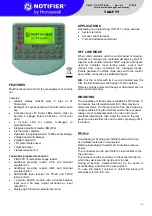
Command
Select To
ADJUST
Change the value of an object.
COMMAND
Manually change the state of an object. All priority 4-7 programs will be released
before the command is issued. Command will be issued at lowest priority (8).
DISABLE/
ENABLE
Lock out reporting, process triggering, and output control for this object. This is
usually used when there are problems with the field equipment. Once the
equipment is repaired, select ENABLE to resume these functions.
HISTORY
See what has happened to this object over a period of time. For analog objects,
48 samples are stored. Ten COSs are stored for binary objects. The History
Summary contains samples, alarm data, date, and time.
LIMITS
See, modify, or add alarm or warning limits for an object. The differential value
will be the same for both warnings and alarm limits. Changing one changes the
other. The high and low warning limits are calculated using the setpoint and
normalband.
AUTO
Control the condition of the object through the application feature. Select
OVERRIDE to release the automatic mode and manually control the object.
OVERRIDE
Control the condition of an object until the AUTO command is selected. ADs,
AOSs, and AODs can be overridden to a selected value. BDs and BOs can be
overridden to a selected state. Release the override status by selecting the
AUTO selection and return the control of the object to the application feature.
SCHEDULE
See, modify, or build schedules for an object. HOLIDAY, REGULAR,
ALTERNATE, and ONE-TIME schedules are available for an object. Dates for
HOL, REG, and ALT modes are set using the CLOCK feature. ONE-TIME
schedules are deleted after the schedule runs.
LIGHTING
CONTROLLER
SCHEDULE
See, modify, or build up to four schedules for a lighting group. NORMAL and
HOLIDAY periods are available. The NORMAL schedules will run when the
FMS is in the REGULAR or ALTERNATE mode. ONE-TIME schedules are not
allowed for the lighting group.
Continued on next page . . .
Table 4a: Network Terminal Commands
20
Network Terminal User’s Manual
















































